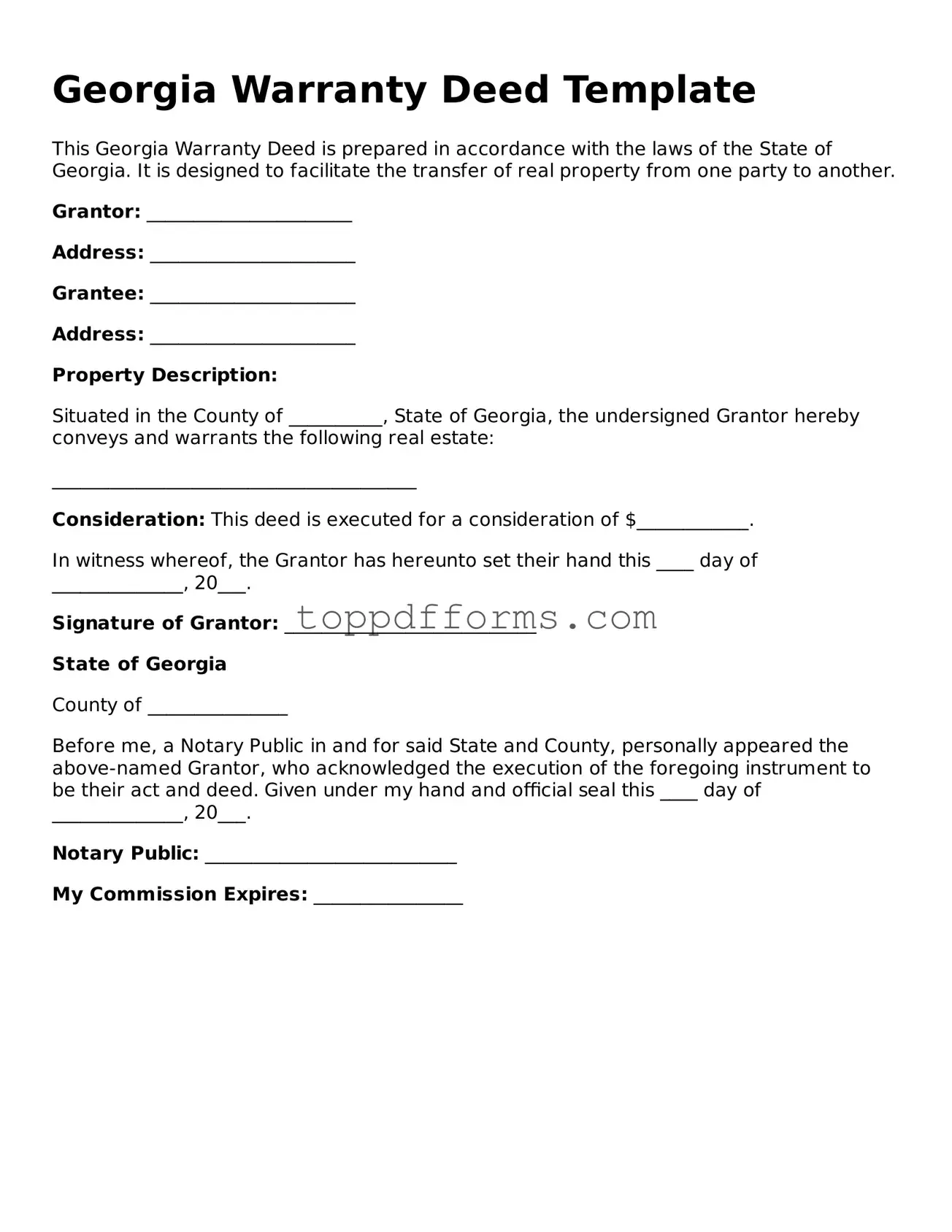Deed Document for Georgia State
Things You Should Know About This Form
What is a Georgia Deed form?
A Georgia Deed form is a legal document used to transfer ownership of real property in the state of Georgia. This form outlines the details of the property being transferred, including its legal description, the names of the parties involved, and the terms of the transfer. It serves as a public record of the transaction and is essential for establishing the new owner's rights to the property.
What types of deeds are available in Georgia?
In Georgia, there are several types of deeds, each serving different purposes. The most common types include the Warranty Deed, which guarantees that the seller holds clear title to the property; the Quitclaim Deed, which transfers whatever interest the seller has without any guarantees; and the Special Warranty Deed, which provides limited guarantees about the title. Understanding the differences between these deeds is crucial for making informed decisions during a property transfer.
How do I complete a Georgia Deed form?
Completing a Georgia Deed form requires accurate information about both the property and the parties involved. Start by clearly identifying the property with its legal description, which can typically be found on the current deed or through local property records. Next, include the names and addresses of the grantor (the seller) and grantee (the buyer). After filling out the necessary information, the deed must be signed by the grantor in the presence of a notary public. Finally, the completed deed should be recorded with the county's Clerk of Superior Court to ensure it is legally recognized.
Do I need a lawyer to prepare a Georgia Deed form?
While it is not legally required to hire a lawyer to prepare a Georgia Deed form, doing so can provide valuable guidance. A lawyer can help ensure that all necessary details are included and that the deed complies with state laws. This is particularly important if the transaction involves complex issues, such as liens or easements. Seeking legal assistance can help prevent potential disputes in the future and ensure a smooth transfer of property ownership.
PDF Overview
| Fact Name | Description |
|---|---|
| Purpose | The Georgia Deed form is used to transfer ownership of real property from one party to another. |
| Types of Deeds | Georgia recognizes several types of deeds, including warranty deeds, quitclaim deeds, and special warranty deeds. |
| Governing Law | The Georgia Deed form is governed by the Official Code of Georgia Annotated (O.C.G.A.) § 44-5-30 et seq. |
| Signature Requirements | The deed must be signed by the grantor (the person transferring the property) to be valid. |
| Notarization | In Georgia, the deed must be notarized to ensure its authenticity and validity. |
| Recording | To protect ownership rights, the deed should be recorded in the county where the property is located. |
| Transfer Tax | A transfer tax may be applicable when the property is transferred, based on the sale price or value of the property. |
Common mistakes
When filling out the Georgia Deed form, individuals often encounter several common mistakes that can lead to complications in property transfers. One frequent error is failing to provide accurate information about the property. The legal description must be precise, including the lot number and subdivision name, if applicable. Omitting or incorrectly stating these details can result in confusion and potential disputes in the future.
Another mistake involves incorrect names of the parties involved in the transaction. It is essential to ensure that the names of both the grantor (the person transferring the property) and the grantee (the person receiving the property) are spelled correctly and match their legal identification. Any discrepancies can lead to issues with the validity of the deed.
People also often neglect to include the necessary signatures. The deed must be signed by the grantor, and in some cases, the grantee may also need to sign. Not having the proper signatures can render the deed invalid. Furthermore, if the grantor is married, the spouse may need to sign as well, depending on the ownership structure of the property.
Additionally, many individuals forget to have the deed notarized. In Georgia, a deed must be notarized to be considered valid. Without a notary's signature and seal, the deed may not be accepted by the county clerk or other relevant authorities, which can hinder the transfer process.
Another common oversight is failing to record the deed with the appropriate county office. Once the deed is executed and notarized, it should be filed with the county where the property is located. This step is crucial, as it provides public notice of the ownership transfer and protects the rights of the new owner.
People sometimes overlook the importance of including any necessary disclosures. Depending on the type of property and the circumstances of the sale, certain disclosures may be legally required. Failing to include these can lead to legal repercussions or disputes after the transfer.
Finally, many individuals do not seek assistance when needed. Filling out a deed can be complex, and it is important to understand the implications of the information being provided. Consulting with a knowledgeable professional can help ensure that all details are correct, thus avoiding potential pitfalls.
Other Common State-specific Deed Forms
Release of Dower Rights Ohio Form - Understanding the type of Deed being used is crucial for all parties involved in a transaction.
For those looking to complete their transactions securely, utilizing a well-prepared document is crucial; you can find a suitable template by visiting PDF Templates, which offers various options tailored to your needs.
Legal House Deed Document - A warranty deed guarantees clear title to the property being transferred.
